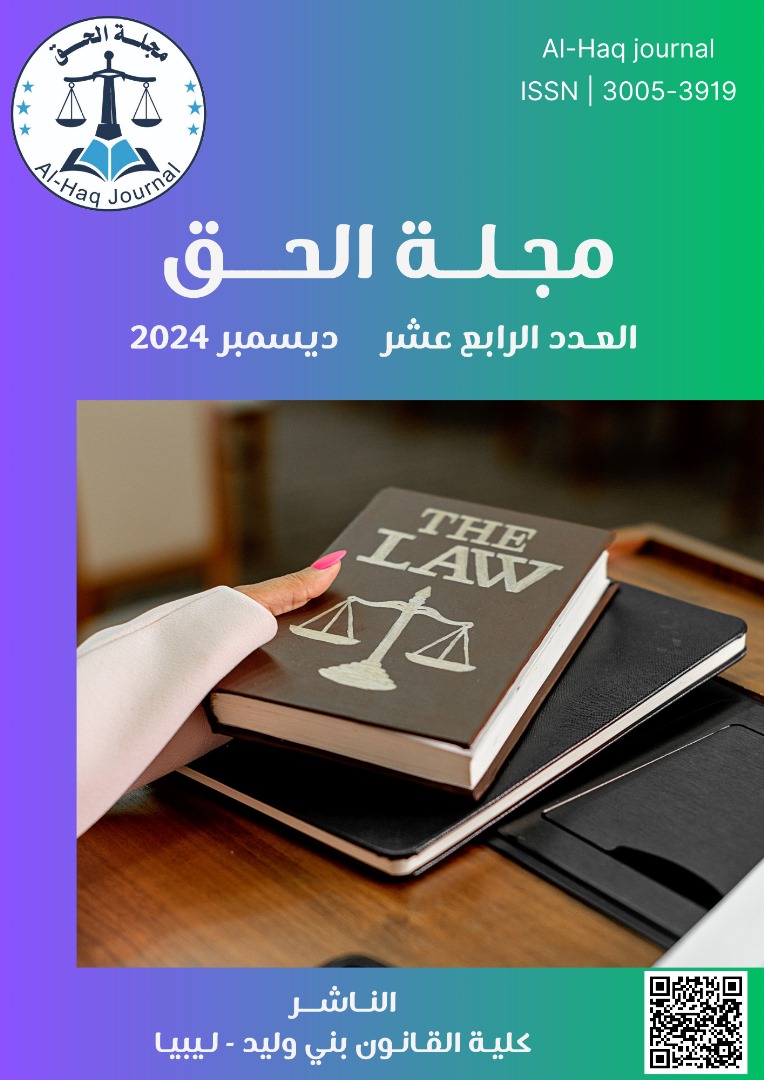Crime of money laundering in the Saudi regime and international law (Comparative study)
DOI:
https://doi.org/10.58916/alhaq.vi.233Keywords:
Crime, money laundering, the Saudi regime, international criminal policy, international lawAbstract
Money-laundering is one of the emerging crimes of the international community as a whole, which has failed to combat it through regional and international conventions, and directs States to incorporate into their domestic laws the criminal norms adopted by these conventions.
the importance of addressing the distinction of international criminal policy and its counterpart in the Kingdom towards the crime of money-laundering; in terms of the expansion of criminalization on both the substantive and the procedural aspects The concept of the crime of money-laundering in the Saudi regime and international law, Statement of the elements of the crime of money-laundering in the Saudi regime and international law and efforts to combat money-laundering in the Saudi regime and international law, by relying on the Saudi anti-money-laundering system International conventions on this subject, to which the Kingdom is a party, and general legal provisions relating to this crime.
One of the most prominent findings of the study was that the Saudi anti-money-laundering regime is one of the best and most explicit in the Kingdom. It is in line with international conventions on combating money-laundering, both in general criminalization and punishment, and in extending criminalization, with the Kingdom limiting banking secrecy in order to combat this crime.
The study also made many recommendations, most notably: the need to pay attention to the training aspect by adding a course in the Kingdom's law schools to teach the crime of money-laundering and its general provisions; holding symposiums and conferences; encouraging scientific research in the field of money-laundering; and amending procedural texts relating to the initiation of criminal proceedings in this offence if committed outside the Kingdom.
Downloads
References
References:
Al-Tarsawe, Essam Ibrahim, Organized Crime, Dar Al-Fikr Al-Arabi, Cairo, 1999.
Al-Tarsawe, Essam, Money Laundering, Egyptian General Book Authority, Egypt, 2002.
Hijazi, Abdel Fattah Bayoumi, The Crime of Money Laundering between Electronic Media and Legislative Texts, Dar Al-Fikr Al-Jami’i, Alexandria, 2006.
Al-Harbi, Hamoud bin Abdullah, Evaluating International Efforts to Combat Money Laundering According to the United Nations Convention against Transnational Organized Crime, Master’s Thesis, Institute of Research and Studies of the Islamic World, Omdurman Islamic University, Sudan, 2007.
Hassan, Saeed Abdul Latif, Money Laundering Crimes between Scientific Change and Legal Regulation, Dar Al-Nahda Al-Arabiyya, Cairo, First Edition, 1997.
Al-Hamadi, Khaled Hamad Muhammad, Money Laundering in Light of Organized Crime, Cairo University, 1423 AH/2002 AD.
Al-Hamadi, Khaled, The Crime of Money Laundering in the Era of Globalization, Dar Al-Nahda Al-Arabiya, 2006.
Al-Hamdani, Israa Hamid Gharib, Criminal Confrontation of the Crime of Money Laundering, A Comparative Study, Master's Thesis, Faculty of Law, Al al-Bayt University, Jordan, 2018.
Al-Hayasat, Ahmed Mahmoud, Obstacles to Combating the Crime of Money Laundering, Master's Thesis, Faculty of Law, Middle East University, Jordan, 2009.
Al-Khudairi, Mohsen Ahmed, Money Laundering, Causes, and Treatment, Arab Nile Group, 2002.
Al-Dulaimi, Mufid Nayef, Money Laundering in Criminal Law, Dar Al-Thaqafa, Amman, First Edition, 2005.
Al-Zamami, Abdullah, Money Laundering in the Kingdom of Saudi Arabia, A Legal Study, Library of Economics and Law, Riyadh, 1431 AH/2010 AD.
Saad, Saleh, International Cooperation in Combating Money Laundering and Terrorism Financing, Union of Arab Banks, Beirut, 2008.
Salama, Muhammad Abdullah, The Legal Entity of Money Laundering, Crime, Criminal Responsibility, Combating, Modern Arab Office, Alexandria, 2007.
Suleiman, Abdul Fattah, Combating Money Laundering, Dar Aladdin for Printing and Publishing, Syria, 2003.
Suwailem, Muhammad Ali, Commentary on the Money Laundering Law in Jurisprudence, Judiciary and International Agreements, Dar Al Nahda Al Arabiya, Cairo, Egypt, 2008.
Al Tarawneh, Muhammad Ibrahim, Combating the Financing of Terrorism, Jordan as a Model, a research published in the Journal of Security Studies, Amman, Issue (1), January, 2009.
Al Tantawi, Ibrahim Hamid, Legislative Confrontation of Money Laundering in Egypt (Comparative Study), Dar Al Nahda Al Arabiya, Cairo, 2003.
Al-Zahir, Ahmed Abdel, Criminal Confrontation of Money Laundering in Arab Legislation, Dar Al-Nahda Al-Arabiya, Cairo, Egypt, First Edition, 2013.
Abdel Moneim, Suleiman, Criminal Responsibility of Banks for Unclean Money, The Phenomenon of Money Laundering, Dar Al-Jamiah Al-Jadida, 1999.
Al-Aryan, Muhammad Ali, Money Laundering Operations and Mechanisms to Combat Them, Dar Al-Jamiah Al-Jadida for Publishing, Alexandria, 2005.
Al-Omari, Ahmed bin Muhammad, The Crime of Money Laundering, An International View of Its Social, Regulatory and Economic Aspects, Al-Ubaykat Library, Riyadh, 2000.
Awad, Safwat Abdel Salam, The Economic Effects of Money Laundering Operations and the Role of Banks in Combating These Operations, Dar Al-Nahda Al-Arabiya, Cairo, 2003.
Awad, Ali Gamal El-Din, Banking Operations from the Legal Perspective, Dar Al-Nahda Al-Arabiya, Cairo, 1981.
Awad, Muhammad Muhyi al-Din, Money Laundering Crimes, Center for Studies and Research, Naif Arab University for Security Sciences, Riyadh, 1425 AH/2004 AD.
Al-Faouri, Uri Fayez, and Qteishat, Enas Muhammad, The Crime of Money Laundering, General Meaning and Legal Nature, A Comparative Study, Wael Publishing House, Amman, Jordan, First Edition, 2002 AD.
Kamel, Sharif Sayed, Combating Money Laundering in Egyptian Legislation, Dar Al-Nahda Al-Arabiya, Cairo, 2002 AD.
Kabish, Muhammad Mahmoud, Criminal Policy in Confronting Money Laundering, Dar Al-Nahda Al-Arabiya, Cairo, Second Edition, 2001 AD.
Interview, Aql Yusuf, The Crime of Money Laundering in the Era of Globalization, a paper presented to the scientific conference on economic crime held at Jerash Private University, Faculty of Law, during the period (29-30), 2002 AD.
Al-Manji, Muhammad, Al-Hayaza, Mansha'at Al-Maaref, Alexandria, Egypt, Second Edition, 1985.
Al-Mail, Faisal Saeed Ahmed, Criminal Policy in Confronting the Phenomenon of Money Laundering in National Criminal Laws and International Criminal Law, Comparative Study, PhD Thesis, 2007.
The Economic Bulletin issued by the Bank of Alexandria, Volume Thirty-Three, 2001.
The Anti-Human Trafficking Crimes System issued by Royal Decree No. (M/40) dated 21/7/1430 AH, and Cabinet Resolution No. (244) dated 20/7/1430 AH.
Documents of the United Nations in its Eighth Congress on the Prevention of Crime and the Treatment of Offenders, Havana, Cuba (7-8/9/1990), Document No. (15/144).
Downloads
Published
Issue
Section
License

This work is licensed under a Creative Commons Attribution-NonCommercial 4.0 International License.









